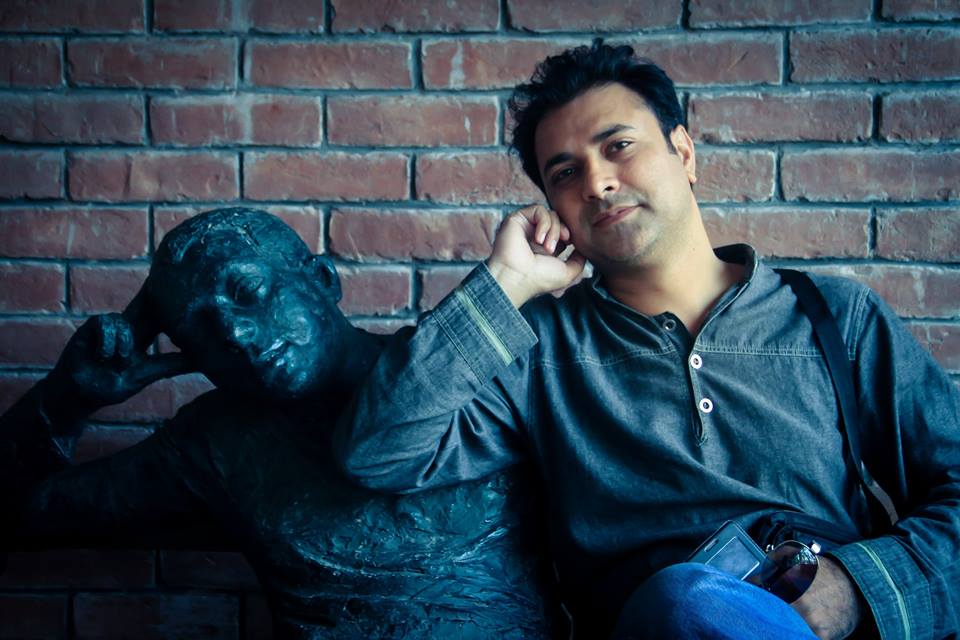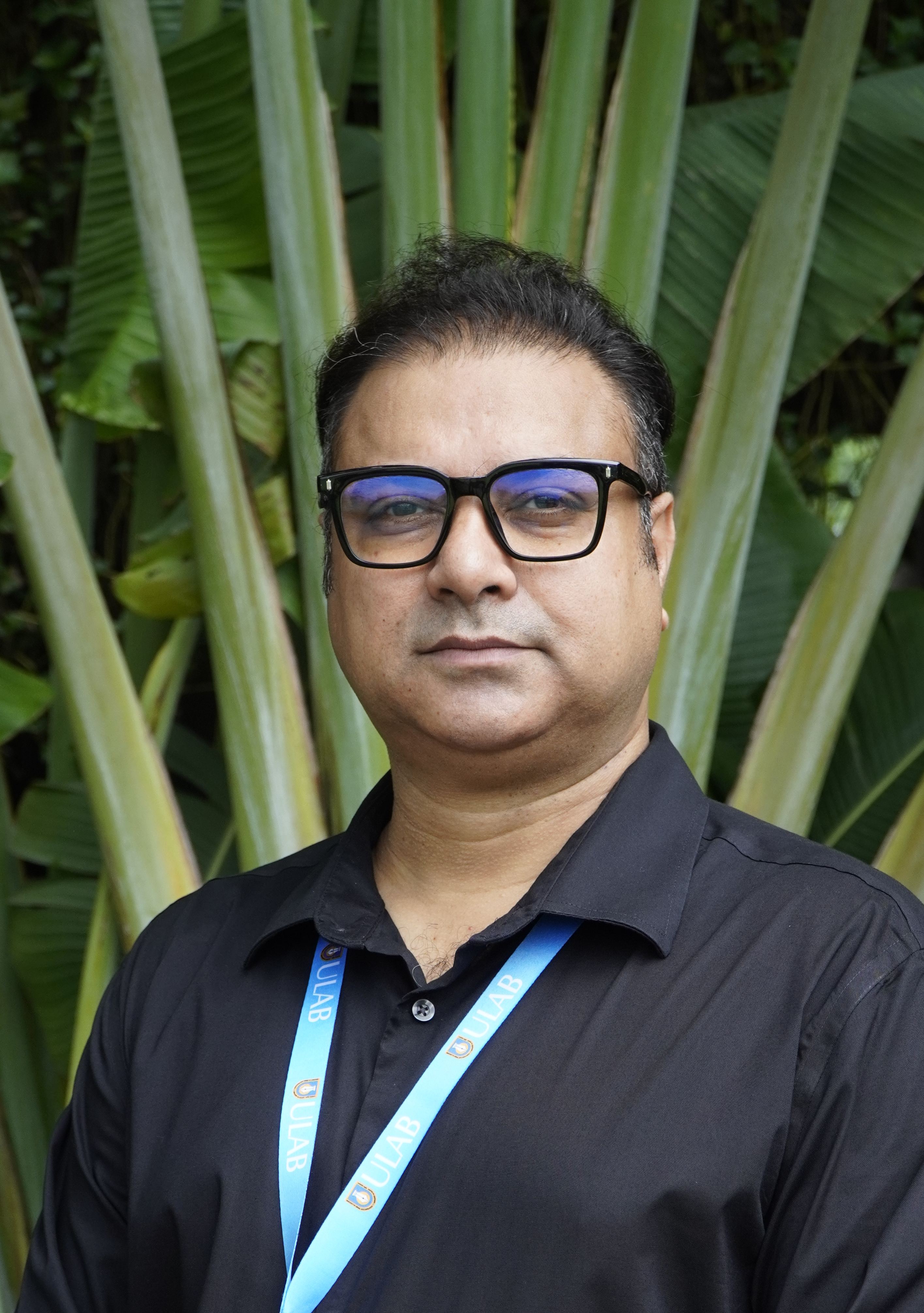Abrar Farhan Zaman
He needs no introduction. A wonderful teacher and researcher, who lights the way for his students, Md. Muntasir Mamun, Assistant Professor at the Department of English and Humanities (DEH), University of Liberal Arts Bangladesh, was interviewed by MUSE Sub-editor Abrar Farhan Zaman. Join them as they turn back the hands of time and take a trip down memory lane…
Could you reflect on your experiences at ULAB since joining in 2013? Are there any nostalgic moments or memories that stand out to you or that you would love to relive or recreate during your time teaching students at DEH?
Most of my ULAB memories surround my experiences with my dear students. One of them happened during my early years at ULAB when I took my students of Romantic Poetry to the Dhanmondi Lake to teach them a poem. I decided to teach the beginning stanzas of William Wordsworth’s “Ode: Intimations of Immortality” in the midst of nature to give my students the feeling of close proximity to nature. And I thought the learners had a great encouragement in reading poetry in such an environment as they read the poet’s experience of connecting to nature. Obviously, I had to take permission from the department authority to go outside the campus and was allowed to remain absent in the classroom during the class hours. I remember I taught for more time than the class duration as I believe everybody was enjoying the session. I would love to arrange more of such academic adventures; but time does not allow me to do so very frequently.
Could you please tell us more about your on-going PhD research on “Sounds and Noises as Orient Features in Shakespeare’s The Tempest and Other Plays”, and how it will have a positive impact on our community?
Ours is a noisy nation you know; we are full of sounds and noises. Sound has discerning variations such as noisy, mysterious, irritating, fearsome, melodic, harsh, funny, and this goes on. The sounds which do not please the ear, therefore, the sense of a person, they become discomforting. This discomforting feeling may turn into fear and paranoia. The key focus of my research is interpreting and analyzing numerous functionalities of sounds, orchestrated in The Tempest and other plays of Shakespeare, in terms of the characters’ perspectives, reactions, and expressions against the sounds.
According to Ashcroft, Griffins, and Tiffin, “the strategy of writing back is a form of resistance,” which implies the captives can overturn the discourse of colonizing period, thereby will resist the captivators, by “reclaiming one’s ownership of oneself by resisting the hegemony and undercutting the tropes of Orientalism” (qtd. in Burney 106). This form of resilience can be addressed as “reverse colonization,” which significantly refers to the colonized people’s sense of national belongingness, precisely against the lingering dominance of the invaders, as India has shown through an exemplary struggle against British dominance, and finally achieved their independence back in 1947.
You have recently written a book of Idioms and Phrases which is part of FRIENDS’ Language Series. Could you take us behind the scenes and walk us through the process of working on a manuscript so that we could learn from your practical experience?
The book was written long ago, but it got published in August 2023. During my lecturer hood at Eastern University, I got a phone call from Bashar Bhai of Friends’ Book Corner that there has been a rising demand from students of various universities for a book on phrases and idioms as there was none in the market of that sort then. I was afraid to hear this as I knew this must be a huge amount of work and would demand a lot of time. But the publisher came to my rescue by stating that I have to do only half of it. The other half will be done by another teacher and Professor Jahurul Islam of University of Rajshahi will edit the book. It took a long time researching and selecting the words and then putting them into sentences. It obviously was a hard job! If it helps students to strengthen their quality of English, the labour will be fruitful.
Having been a part of ULAB for a long time, could you please share your observations of how students and teachers have changed over the years?
When I joined ULAB back in 2013, I did not find the students much interested in research writing though they were very good at showing creativity in their works. Then we had our MA program started, Scholars’ Program for more meritorious students – these things might have had an impact on them. And nowadays, I see many of our students are working as research assistants at various places, their quality of BA and MA theses have improved as well. We are now winning Inter University Cultural Contest and Academic Paper Contest on a regular basis. As for teachers, we have quite a few changes in the faculty setting: many teachers left, many joined in to cover their places. The inclusion of Professor Syed Manzoorul Islam (Professor Kaiser Haq and Professor Shamsad Mortuza have already been there) made the DEH faculty unit one of the best in the country.
Is there an aspect of education from the past that you would like to advocate to be reinstated? You have worked on “William Wordsworth and Education” for your M. Phil, could you share insights from that research and how we can apply it to the way we approach teaching?
In the major poems of William Wordsworth, there is an underlying theme of moral education to be received from Nature. The idea is not that there is any sense of institutionalized education. The idea is that Wordsworth’s major poems show how moral and spiritual development can be attained from a close proximity to Nature. Wordsworth conceived of nature as an educational guide, and enshrined it with moral and spiritual values. My research seeks to show how Education that places subject matter in its natural setting and presents it in a natural way is superior to the artificial analysis and abstractions of language. The romantic tradition holds that morality, like everything else, comes naturally. The student, engaged in real life situations and exposed to good role models, comes to understand the need for sharing, kindness, honesty, diligence, loyalty, courage, and other virtues.
William Wordsworth’s and Jean Jacques Rousseau’s unifying insights and organic visions about education can protect our essential humanity against the capitalist threat. This can also restore the lost self-reliance or self-respect of modern man suffering from self-pity or self-doubts leading towards neurosis, psychosis and other such diseases.
You’ve been the advisor of Theatre ULAB for a while now. Could you share some of the most memorable productions or moments that have occurred under your guidance?
I have been the advisor to Theatre ULAB for over 10 years and I have seen many ups and downs in this extra-curricular entity. The club was almost dead when I took over. Our BA 3rd year student Mahbuba Sultana Troya stepped up to lead as the president of the club and it started to return to its former glory. Some of the stage productions are worthy to be mentioned here: Rabindranath Tagore’s DAKGHOR was dedicated to the memory of Khaled Khan. Satyajit Ray’s HIROK RAJAR DESHE, Aly Zaker’s DORPON (Bangla adaptation of Shakespeare’s HAMLET), MUKHORA ROMONI BOSHIKORON (Bangla translation of Shakespeare’s THE TAMING OF THE SHREW), Zahid Shohag’s PRAY TIN/ CHAR JON all have been full house shows and claimed name and fame for the club.
Are there any upcoming projects or initiatives within Theatre ULAB that you are particularly excited about, and how do you envision them impacting the ULAB community?
As per the suggestion of Dr. Kazi Anis Ahmed, Honorable President, Board of Trustees, ULAB, we are planning to stage The Bald Soprano (French:La Cantatrice Chauve), the first play by the Franco-Romanian playwright Eugène Ionesco.The Bald Soprano is an absurdist satire on the English language and culture. Its absurdist nature leaves its meaning open to interpretations. The most common interpretation of the work maintains that the play is a critique of the breakdown of communication in the modern era. Irrationally angry, the characters’ comments are frequently incorrect, or meaningless. All of this illustrates one of the most significant absurdist themes, namely how difficult it is for people to relate to one another in the current world in an honest way.
Given that the theme of this MUSE issue is nostalgia, how do you think students will remember their time at DEH?
Students can answer this question better than I can. I believe they will miss DEH: they’ll miss their friends, the faculties, DEH picnic, etc. They might also miss the pressure of studies; specially the assignments and presentations they are used to prepare within a time limit. The freedom of roaming at campus and outside might be missed too when the students turn into professional workers.
Here’s a fun question. If you could invite any fictional character to DEH or travel back in time to any literary era, who or when would that be and why?
I would like to invite all the super heroes because we need them to reach the top of the ranking!
You have taught your students that being a gentleman comes from good behaviour, ethics, empathy, and solidarity rather than simply social class. What other valuable lessons would you like to share that students have learned from you over the years in your literature classroom?
Love and respect! I have always tried to teach my students that they should love others and respect other’s feelings. If they want to be loved and respected, they must practice these themselves because whatever goes around, comes around.
As our conversation draws to a close, if you were to leave your students with a final message of inspiration, what heartfelt words would you impart to them, encapsulating the essence of your teaching philosophy and the profound impact you hope to have had on their lives?
Patience would be a great quality, I think. I would suggest my students to keep patience in every sphere of life. Bad times may come at any stage; life may seem valueless, meaningless, unbearable. Fight it back with your patience! Keep yourself protected and wait with patience: things will come in your favour automatically. Victory will be yours!


